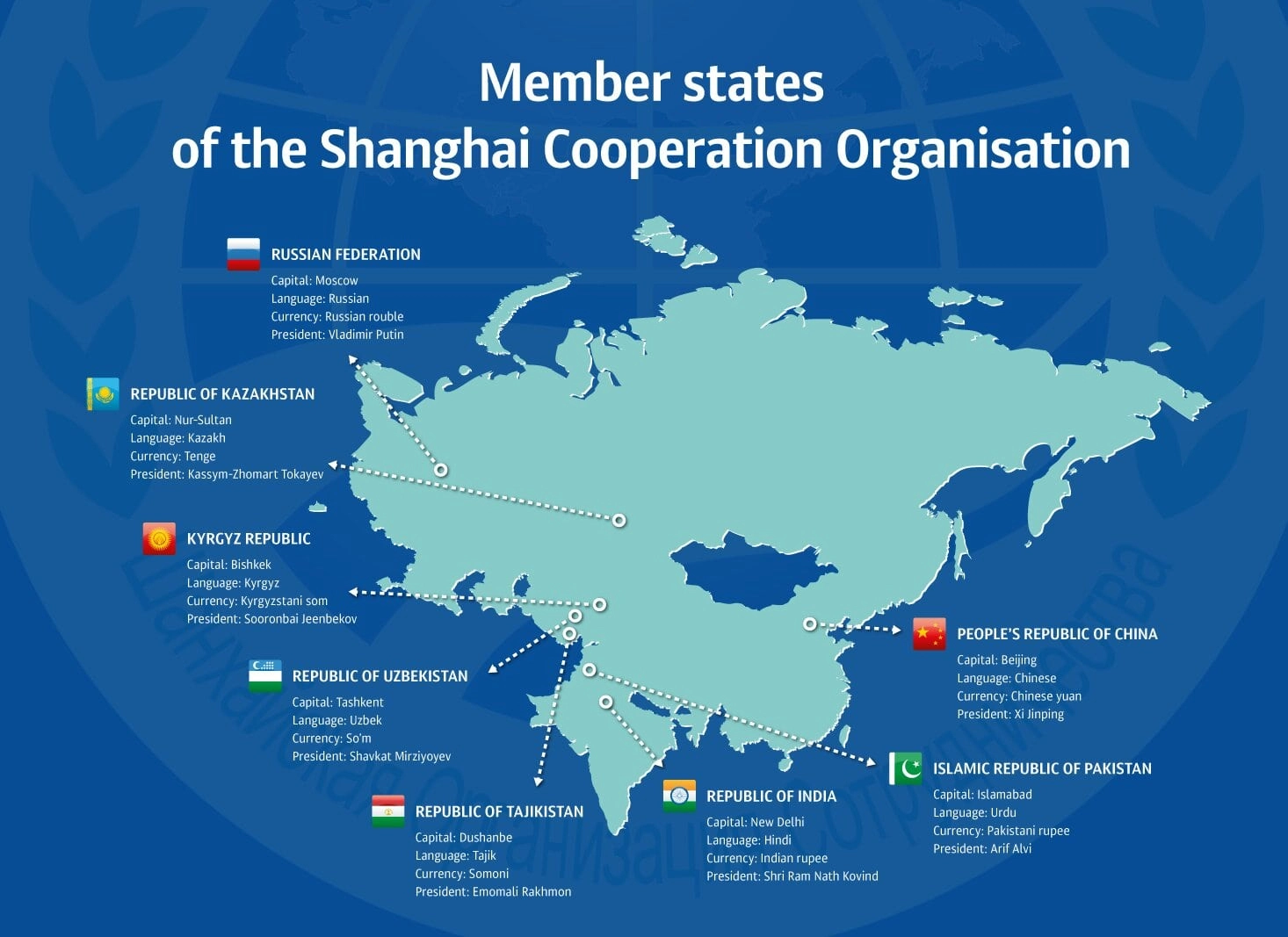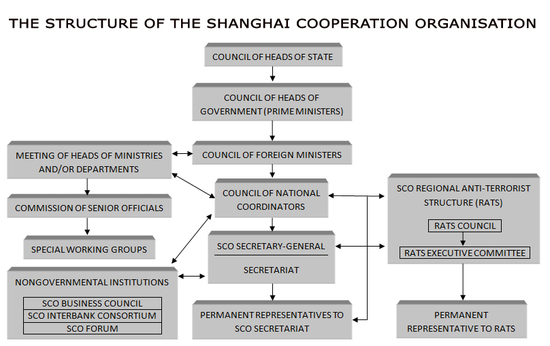International Relations
India and Shanghai Cooperation Organisation (SCO)
- 26 Apr 2023
- 9 min read
This editorial is based on SCO meet highlights China’s growing role and India’s challenge which was published in Indian Express on 26/04/2023. It talks about India, as the chair of the organisation, has opportunity of discussing bilateral issues and easing out tensions between countries.
For Prelims: Members of SCO, RATS, UNESCO World Heritage Sites, China-Pakistan Economic Corridor (CPEC),International North-South Transport Corridor (INSTC).
For Mains: Significance of SCO for India, Challenges of SCO.
The visit of Chinese and Russian defence ministers to attend a ministerial meeting of the Shanghai Cooperation Organisation (SCO) in Delhi is attracting attention. India, as the chair of the organisation, has several bilateral issues to discuss with fellow SCO members such as de-escalation of border confrontation with China and supply of Russian spares and arms to India amidst the war in Ukraine.
Many countries are queuing up to join the SCO, which is inclusive and highlights the rise of non-Western security institutions. However, despite growing interest in the SCO from regional states, internal contradictions within the organisation are casting a shadow over its strategic coherence.
Who are the Members?
- Membership:
- The SCO has eight members, including China, India, Kazakhstan, Kyrgyzstan, Pakistan, Russia, Uzbekistan, and Tajikistan. Iran is set to join the SCO.
- Observers:
- Afghanistan, Belarus, and Mongolia are observers who would like to follow Tehran.
- Dialogue Partners:
- The list of current and incipient dialogue partners includes Azerbaijan, Armenia, Egypt, Qatar, Turkey, Saudi Arabia, the United Arab Emirates, Maldives, Nepal, and Sri Lanka.
What are the Conflicts Among Member Countries of SCO?
- Conflicts Exist Between:
- India and China over Border Issues:
- After the 18th round of India- China Corps Commander Level Meeting still there is no breakthrough in easing tensions.
- India and Pakistan over Terrorism:
- State sponsored terrorism is cause of tension between India and Pakistan.
- Frequent cease fire violations on India Pakistan border is another cause of concern.
- Kyrgyzstan and Tajikistan over Border Issues:
- The escalation of conflict between the two countries, as witnessed on September and then again in November 2022, has been a troubling development for the region.
- The conflict has the potential to cause a negative impact on the stability of Central Asia and its neighbouring regions.
- There are several conflicts between Taliban-led Afghanistan and Pakistan which makes the border area of the two countries unstable.
- The SCO's main objective is to promote peace in Eurasia, but its ability to cope with intra-state and inter-state conflicts among member states is under scrutiny.
- India and China over Border Issues:
What are the Challenges?
- China’s Rise:
- China’s rise is increasing the prospects for China’s emergence as the dominant force in inner Asia.
- This has led to external pressures from other regional powers, such as the United States, which has sought to contain China's rise and limit its influence in the region.
- Limited institutional mechanisms:
- While the SCO has a number of bodies, such as the Council of Heads of State, the Council of Ministers of Foreign Affairs, and the Council of National Coordinators, these bodies lack the formal decision-making and enforcement powers that are necessary for effective governance.
- SCO lacks a formal mechanism for resolving disputes between member states.
- Divergent Interests and Disagreements:
- The SCO includes member states with different political systems, economic models, and strategic priorities such as CPEC, border infrastructure projects etc., which can lead to internal conflicts and disagreements on issues such as economic cooperation and security.
- Limited geographical scope:
- The SCO's geographical focus is limited to Eurasia and neighboring regions, which restricts its ability to engage with global issues and challenges.
- Western skepticism and criticism:
- The SCO faces criticism from Western countries for its lack of democratic credentials, its support for authoritarian regimes, and its internal conflicts and border disputes among members.
What is the Importance of SCO for India?
- Economic Cooperation:
- The SCO provides a platform for India to enhance economic cooperation with Central Asian countries, which have vast reserves of natural resources.
- India is seeking to increase its trade and investment ties with the SCO countries to diversify its economic partnerships.
- Energy Security:
- Central Asia has vast reserves of oil and gas, and India is looking to tap into these resources to enhance its energy security.
- The SCO provides a forum for India to engage with the energy-rich countries of Central Asia and explore opportunities for cooperation in the energy sector.
- The Samarkand Declaration, signed at the 22nd Summit, centralizes connectivity which is a priority for India, as well as energy and food security.
- Cultural Cooperation:
- The total Cultural Heritage of the SCO member states, observers and partners include 207 UNESCO World Heritage Sites.
- SCO member countries have decided to designate one city (from SCO member countries) as tourism and cultural capital every year under a rotating initiative.
- “Kashi” (Varanasi) has been designated as the first cultural capital of the SCO under this initiative.
- Counterterrorism:
- The SCO has a strong focus on counterterrorism cooperation.
- India, which has been a victim of terrorism, can benefit from the collective efforts of the organization to combat terrorism in the region.
What is the Significance of the SCO?
- Economic Cooperation:
- The eight member countries of SCO represent around 42% of the world population and 25% of the global GDP. There is an immense tourism potential in the region which can be promoted by increasing awareness about SCO countries.
- Connectivity:
- The SCO is promoting connectivity among its member states through infrastructure projects, including the China-Pakistan Economic Corridor (CPEC) and the International North-South Transport Corridor (INSTC).
- Security Cooperation:
- The main threats which are the focus of the SCO include terrorism, separatism and extremism.
- Regional Anti-Terrorist Structure (RATS) to promote cooperation among member states in the fight against terrorism, separatism, and extremism.
- RATS provides a platform for sharing intelligence, conducting joint exercises and operations, and coordinating actions to prevent and combat terrorism in the region.
Conclusion
- The SCO is an attractive forum for regional states, but its internal contradictions are a cause for concern. Preventing conflict between member states is a higher priority for the SCO, but its record here is not impressive. While China's growing regional influence may come at Russia's expense, Russia and China have drawn closer than ever before and have little reason to quarrel over Central Asia. Russia's muscle and China's money provide a sensible basis for their strategic division of labour in Central Asia to keep the Western powers out of the region.
|
Drishti Mains Question Despite being a multilateral organization, the Shanghai Cooperation Organization (SCO) faces significant challenges in achieving its goals. Analyze the key challenges faced by the SCO and suggest measures to enhance its effectiveness in promoting regional stability and economic cooperation. |
UPSC Civil Services Examination Previous Year’s Question (PYQs)
Mains
Q. Critically examine the aims and objectives of SCO. What importance does it hold for India? (2021)






